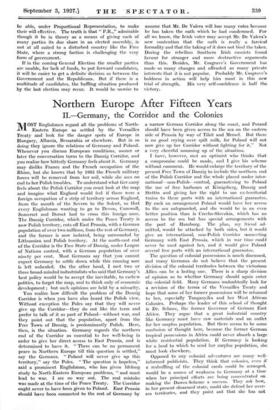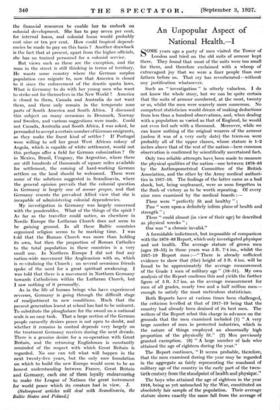M OST Englishmen regard all the problems of North- Eastern Europe
as settled by the Versailles Treaty and look for the danger spots of Europe in Hungary, Albania, Bessarabia or elsewhere. But in so doing they ignore the relations of Germany and Poland. Whenever you discuss European conditions, sooner or later the conversation turns to the Danzig Corridor, and you realize how bitterly Germany feels about it. Germany may dislike France and the French occupation of the Rhine, but she knows that by 1935 the French military forces will be removed from her soil, while she sees no end to her Polish troubles. To understand what Germany feels about the Polish Corridor you must look at the map and imagine what England would feel if there were a foreign occupation of a strip of territory across England, from the mouth of the Severn to the Solent, so that every Englishman wanting to go to Devon, Cornwall, Somerset and Dorset had to cross this foreign zone. The Danzig Corridor, which under the Peace Treaty is now Polish territory, cuts off East Prussia, with a German population of over two millions, from the rest of Germany, and the former is now isolated, being surrounded by Lithuanian and Polish territory. At the north-east end of the Corridor is the Free State of Danzig, under League of Nations control, with a German population of over ninety per cent. Most Germans say that you cannot expect Germany to settle down while this running sore is left unhealed. On the other hand, I met two or three broad-minded industrialists who said that Germany's best policy would be to accept the inevitable, to eschew politics, to forget the map, and to think only of economic development ; but such opinions are held by a minority.
You realize how difficult the problem of the Danzig Corridor is when you have also heard the Polish view. Without exception the Poles say that they will never give up the Corridor—they do not like the term and prefer to talk of it as part of Poland—without war, and they point out that the population, apart from the Free Town of Danzig, is predominantly Polish. Here, then, is the situation. Germany regards the northern end of the Corridor as essential to her well-being in order to give her direct access to East Prussia, and is determined to have it. " There can be no permanent peace in Northern Europe till this question is settled," say the German's. " Poland will never give up this territory," say the Poles. " The question is hopeless," said a prominent Englishman, who has given lifelong study to North-Eastern European problems, " and must lead to war. I see no way out. The real mistake was made at the time of the Peace Treaty. The Corridor ought never to have been given to Poland. East Prussia should have been connected to the rest of Germany by a narrow German Corridor along the coast, and Poland should have been given access to the sea on the eastern side of Prussia by way of Tilsit and Memel. But there is no good crying over spilt milk, for Poland will not now give up her Corridor without fighting for it." Not a very cheerful summing up of the situation.
I have, however, met an optimist who thinks that a compromise could be made, and I give his scheme without comment. He would enlarge the territory of the present Free Town of Danzig to include the northern end of the Polish Corridor and the whole placed under inter- national—non-Polish—control, guaranteeing to Poland the use of free harbours at Konigsberg, Danzig and Stettin and giving her the right to use ex-territorial trains to these ports with an international guarantee. By such an arrangement Poland would have her access to the sea safeguarded, and she would be in an even better position than is Czecho-Slovakia, which has no access to the sea but has special arrangements with the port of Hamburg. The plan, my friend ad- mitted, would be attacked by both sides, but it would give an international, non-Polish Corridor connecting Germany with East Prussia, which in war time could never be used against her, and it would give Poland several free ports with an international guarantee.
The question of colonial possessions is much discussed, and many Germans do not believe that the present division of the colonial territories between the victorious Allies can be a lasting one. There is a sharp division of opinion as to whether Germany should again enter the colonial field. Many Germans undoubtedly look for a revision of the terms of the Versailles Treaty and hope that some of her former possessions will be returned to her, especially Tanganyika and her West African Colonies. Perhaps the leader of this school of thought is Dr. Schnee, the former Governor of German East Africa. They argue that a great industrial country like Germany must have raw materials and an outlet for her surplus population. But there seems to be some confusion of thought here, because the former German tropical possessions in Africa could never absorb a large white residential population. If Germany is looking for a land to which to send her surplus population, she must look elsewhere.
Opposed to any colonial adventures arc many well- informed publicists. They think that colonies, even if a reshuffling of the colonial cards could be arranged, would be a source of weakness to Germany at a time when her principal efforts are being concentrated on making the Dawes Scheme a success. They ask liow, in her present disarmed state, could she defend her over- sea territories, and they point out that she has not the financial resources to enable her to embark on colonial development. She has to pay seven per cent. for internal loans, and colonial loans would probably cost nine or ten per cent. How could tropical depend- encies be made to pay on this basis ? Another drawback is the fact that at present, apart from the higher officials, she has no trained personnel for a colonial service.
But views such as these are the exception, and the man in the street is still thinking in terms of territory. He wants some country where the German surplus population can migrate to, now that America is closed to it since the enforcement of the drastic quota laws. What is Germany to do with her young men who want to strike out for themselves in the New World ? America is closed to them, Canada and Australia do not want them, and there only remain in the temperate zone parts of South America and South Africa. I discussed this subject on many occasions in Denmark, Norway and Sweden, and various suggestions were made. Could not Canada, Australia and South Africa, I was asked, be persuaded to accept a certain number of German emigrants, as they make the finest kind of settler ? If Portugal were willing to sell her great West African colony of Angola, which is capable of white settlement, would not this perhaps offer a field for German colonization ? Or in Mexico, Brazil, Uruguay, the Argentine, where there are still hundreds of thousands of square miles available for settlement, the coming of hard-working German settlers on the land should be welcomed. These were some of the solutions suggested in Scandinavia, where the general opinion prevails that the colonial question in Germany is largely one of amour propre, and that Germany resents the prevalent Allied view that she is incapable of administering colonial dependencies.
My investigation in Germany was largely concerned with the ponderables. What of the things of the spirit ? As far as the traveller could notice, as elsewhere in Nordic Europe the Lutheran Church does not seem to be gaining ground. In all these Baltic countries organized religion seems to be marking time. I was told that the Roman Church was more than holding its own, but then the proportion of Roman Catholics to the total population in these countries is a very small one. In Northern Europe I did not find any nation-wide movement like Anglicanism with us, which is re-vitalizing the Church ; on several occasions friends spoke of the need for a great spiritual awakening. I was told that there is a movement in Northern Germany towards Catholicism within the Lutheran Church, but I saw nothing of it personally.
As in the life of hunian beings who have experienced reverses, Germany is going through the difficult stage of readjustment to new conditions. Much that the Present generation learnt at school has had to be unlearnt. To substitute the ploughshare for the sword on a national Scale is no easy task. That a large section of the German people earnestly desires peace is not open to doubt, and whether it remains in control depends very largely on the treatment Germany receives during the next decade. There is a genuine desire for a co-operation with Great Britain, and the returning Englishman is constantly reminded of the respect with which Great Britain is regarded. No one can tell what will happen in the next twenty-five years, but the only sure foundation on which to build the new Europe would seem to be an honest understanding between France, Great Britain and Germany, each one of them loyally endeavouring to make the League of Nations the great instrument for world pea& which its creators had in view. J.
(Subsequent -artieles- will deal with Scandinavia, the Baltic Statis and POland..)











































 Previous page
Previous page